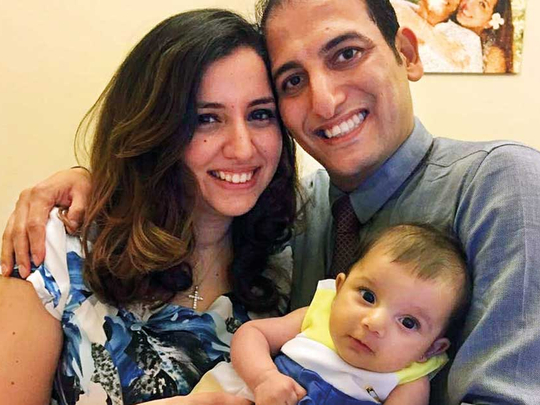
Dubai: The kiss that resulted in the death of an 18-day-old infant girl in the US is a fresh reminder to parents about how a simple smooch on the cheek can put your newborn baby’s life at risk, warn members of the UAE medical community.
The story of Mariana Sifrit, who died of a deadly virus transmitted from a kiss, made headlines across the globe, and her parents have since been calling out to people to not allow anyone to kiss their babies.
Sifrit suffered from viral meningitis caused by the orofacial herpes, which she contracted when she was less than a week old during a wedding occasion, and her body was not strong enough to fight back.
Herpes Simplex Virus is categorised in two types: the orofacial herpes (HSV-1), which causes inflamed blisters (cold sores) around the mouth, and the genital herpes (HSV-2), which is the sexually transmitted infection.
Doctors here are warning parents from communicable diseases and viruses, like HSV-1, that can be passed on when their newborn babies are kissed by others.
“It is a known danger in the medical community internationally and in the UAE. It’s easy for newborn babies to contract diseases and infections from kisses and in other ways and this happens because their immune systems are weak. Newborns are not born with a fully developed immune system at birth,” he explains.
Saliva and skin can act as a mode of transmission of diseases and infections, he added.
Babies in the Arab world can contract the same diseases in the rest of the world and HSV-1 is one of them. “It is the most notorious one of them,” Dr Tomar pointed out.
“This is because the symptoms in newborns are non-specific, and are often confused with bacterial infections, which results in a delay in treatment. Herpes has a high morbidity and mortality (up to 70 per cent) in newborns. Herpes virus in the newborn can cause multi-organ failure, including both meningitis and acute liver failure.”
Dr Tomar pointed out that though breast feeding is known in strengthening the baby’s immunity, the baby will still not be able to fight a virus. “Mothers transfer their immunity onto their baby by way of antibodies, through breast milk. However, it is the cellular response not the antibodies that is highly involved in antiviral defence and in the first three months, it is not yet developed in an infant.”
The contraction of diseases and infections can also happen in older children, like any child above six months depending on their immunity status and type of virus, he added.
“Human saliva carries innumerable organisms and if an infected person inadvertently kisses a baby, he/she is most likely to infect the baby. Carriers can transmit the virus despite not having an open sore.
“Moreover, if someone had a cold sore, it is always better to ask them to maintain distance until the condition has been cured completely. Giving a baby the best chance at life is a parent’s right and responsibility and no one should make them feel guilty for expressing caution,” she said.
Dr Venkateswaran also said individuals with other communicable diseases like cold and flu, or tuberculosis can pass on the infection when kissing or touching the baby.
There are other conditions that can pose a risk to the baby when contracted. Congenital infections acquired by babies from their mother, either through placenta as foetus or during birth through the passage through birth canal, both doctors said.
“Babies can also be infected if their mother has genital herpes,” said Dr Tomar. According to WHO, neonatal herpes is an estimated 10 out of every 100,000 births globally.
The doctors have advised parents to avoid their babies getting into close contact with adults with active herpes lesions (cold sores) and to ensure others have good hand hygiene when cuddling and touching their babies.
Symptoms of an infection in a baby
Fever
Being lethargic
Irritability
Rapid breathing
Poor feeding
Poor (weak) cry
Vesicular rash (skin rashes)
Seizures
What do parents say?
Gulf News spoke to two parents who said they are concerned about their babies being kissed by relatives and friends, but find it hard to tell them to keep their distance.
Mohammad Abbas, Indian father of a four-month-old baby:
It’s especially rude in eastern culture to stop people from kissing the baby. From my personal experience, everyone couldn’t stop kissing my baby when he was born. If I tell my mum or sisters to not kiss the baby, they wouldn’t understand. My baby picked up a bad flu at two months and his immune system was not up for it. He had to be hospitalised at that time. We were very concerned about him.
Therese Masoud, mother of a six-month-old baby:
In our culture, kissing a baby is a sign of care and expressing your happiness to see the baby. However, the fact is that babies have low immunity compared to adults so they are more prone to contract any bacteria or virus from close contacts. Our doctor has even warned us that we are the only ones who can kiss her but it is very hard to tell others, especially elderly people that they cannot kiss our child. We have tried to tell people in a nice way but they feel we are being overprotective when, in fact, we just want what’s best for our kid.







